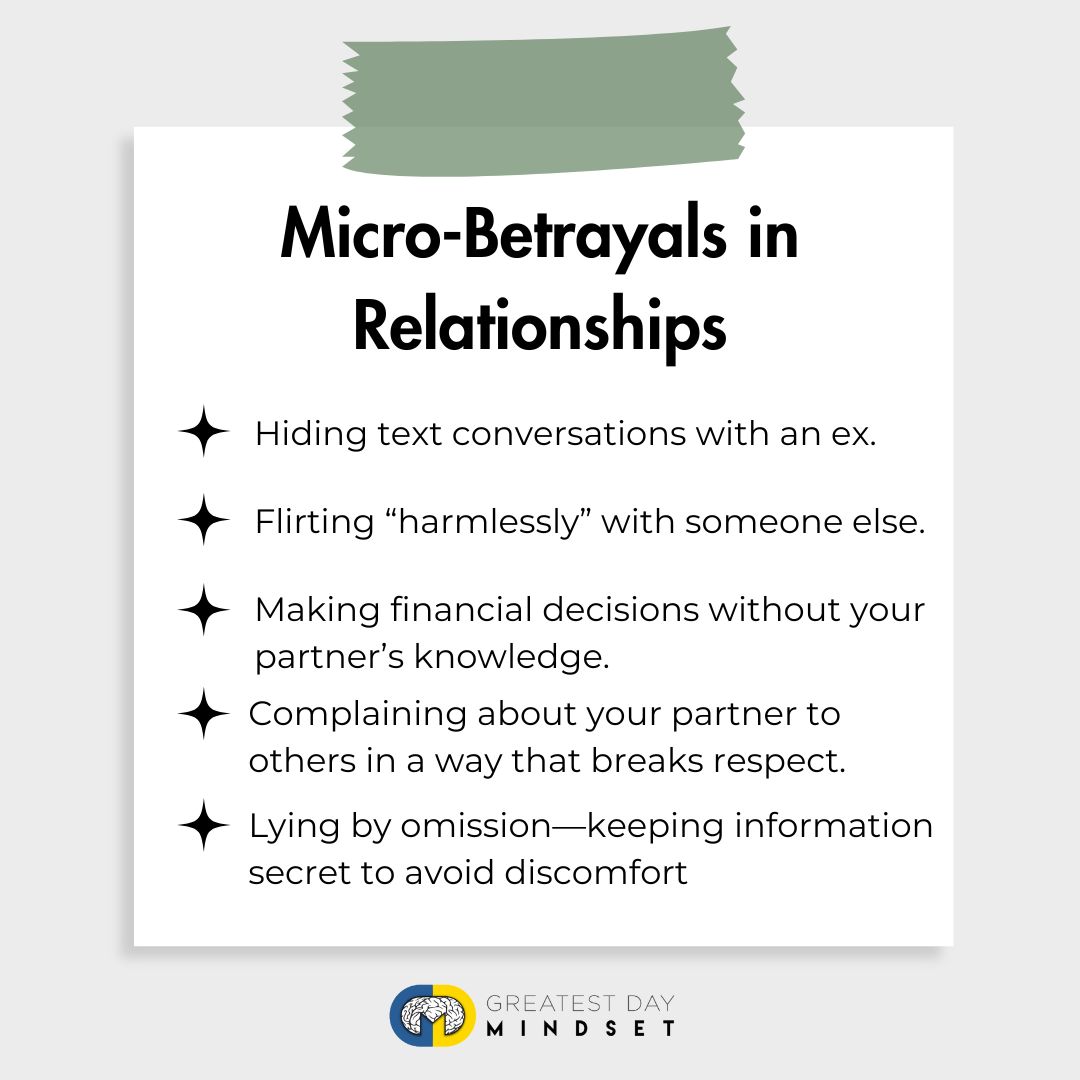The Little Lies That Break Big Trust: Micro-Betrayals in Relationships
May 08, 2025
“It’s not cheating—it was just a message.”
“I didn’t tell them because I didn’t want to start a fight.”
“It’s just a secret credit card… I’ll pay it off before they notice.”
Sound familiar?
These moments may not look like betrayal at first glance—but over time, they chip away at the foundation of even the strongest relationships.
Welcome to the world of micro-betrayals: the subtle, often invisible fractures in trust that silently build tension, insecurity, and emotional distance between partners.

What Are Micro-Betrayals?
Micro-betrayals are small acts of disloyalty, secrecy, or boundary-pushing that, while seemingly minor on the surface, can deeply erode emotional safety and intimacy in a relationship.
They include things like:
-
Hiding text conversations with an ex
-
Flirting “harmlessly” with someone else
-
Making financial decisions without your partner’s knowledge
-
Complaining about your partner to others in a way that breaks respect
-
Lying by omission—keeping information secret to avoid discomfort
Unlike infidelity or major betrayals, micro-betrayals are easy to rationalize, which makes them more dangerous: “It’s not a big deal. I didn’t actually do anything wrong.”
But they are a big deal—especially over time.
Why Do Micro-Betrayals Happen?
These behaviors don’t come out of nowhere. They’re usually symptoms of deeper emotional patterns or unmet needs.
1. Avoidance of Conflict
Many people hide things because they fear confrontation, not necessarily because they want to deceive. They’d rather “keep the peace” than be honest.
Real-life example:
Sam deletes his texts with a coworker before his partner sees them—not because he’s cheating, but because he knows she’s insecure and doesn’t want a fight. The problem? Now she doesn’t trust him, and her insecurity grows.
2. Unmet Emotional Needs
Sometimes, micro-betrayals are a cry for attention, validation, or autonomy.
Real-life example:
Jenna has been feeling ignored for months. She starts flirting in DMs to feel seen—but tells herself it’s “nothing.” Meanwhile, her partner senses her distance and becomes withdrawn, creating a vicious cycle.
3. Poor Boundaries (Internal and External)
Many people have never reflected on what betrayal actually means to them. As a result, they operate in gray areas, never realizing they’ve crossed a line—until it’s too late.
Did you know?
According to Dr. John Gottman, trust is built or broken in the tiniest of moments—what he calls “sliding door moments.” That’s when a partner makes a decision: turn toward the relationship, or away from it.
Why Micro-Betrayals Matter
It’s not about the act—it’s about the message behind it.
Micro-betrayals send the unspoken message:
👉 “You’re not safe here.”
👉 “I’m willing to prioritize my comfort over our connection.”
👉 “I don’t fully respect this relationship.”
Over time, this creates:
-
Emotional withdrawal
-
Anxiety and hypervigilance
-
Lowered relationship satisfaction
-
Erosion of intimacy and open communication
And if left unaddressed? Micro-betrayals can escalate into macro betrayals—emotional or physical affairs, financial secrets, or even complete emotional detachment.
How to Recognize Micro-Betrayals
Here are some reflection prompts to get honest with yourself or gently bring up with a partner:
-
Have I ever avoided telling my partner something out of fear of their reaction?
-
Do I find myself seeking validation from others in ways I wouldn't want my partner to see?
-
Do I downplay or hide behaviors because I know they’d hurt my partner if revealed?
-
Have I set clear boundaries for emotional or financial fidelity—and am I upholding them?
If the answer is “yes” to any of these, don’t panic. You’re not alone—and awareness is the first step to healing.
What to Do If You Notice Micro-Betrayals (In Yourself or Your Partner)
If You’re the One Acting Out:
-
Get Curious, Not Defensive
Ask yourself what need you were trying to meet. Were you lonely? Angry? Avoiding conflict? Understanding your why prevents future harm. -
Practice Repair
Offer a genuine apology. Not just “sorry you feel that way,” but “I see how this broke your trust, and here’s how I’ll show up differently.” -
Strengthen Transparency
Create habits of checking in, being honest even when it’s uncomfortable, and sharing your inner world—not hiding it.
If Your Partner Is the One Acting Out:
-
Avoid Labeling Too Quickly
Jumping to “you’re a liar” shuts down growth. Instead, say: “This feels like a breach of trust to me. Can we talk about what led to it?” -
Express the Impact, Not Just the Incident
Help them understand how it made you feel—unsafe, disconnected, afraid—not just that it “was wrong.” -
Set Clear Agreements Going Forward
Define together what feels like betrayal, what feels safe, and how you’ll both be held accountable with compassion.
Building Back Trust—One Honest Moment at a Time
Trust isn’t built in grand gestures. It’s built in the everyday choices to be honest, open, and emotionally present—especially when it’s hard.
If you’ve experienced micro-betrayals in your relationship, know this:
You’re not doomed. You’re being invited to rebuild something stronger.
Start with one brave conversation.
Micro-betrayals are like emotional paper cuts. One might sting. Many left untreated can become infected and destroy connection.
But when you name them, face them, and heal them together—you build a relationship rooted in honesty, safety, and intimacy that can weather any storm.



